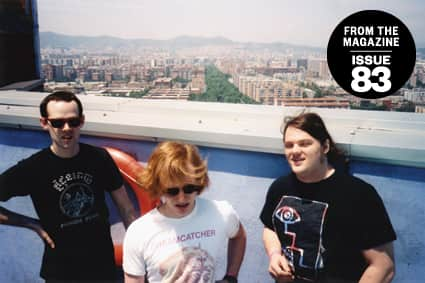With over 40 releases to its name, Emeralds—the trio of Steven Hauschildt, Mark McGuire and John Elliott—has established itself over the past six years as one of the most prolific acts in contemporary synth-based music, and also one of the most reclusive. Even more than their 2010 breakout record, Does It Look Like I'm Here?, the band’s new album shows that they’ve come a long way from endlessly droning, self-released productions. Just to Feel Anything is the masterfully structured product of the band’s first stint in a professional studio (Tangerine Sound in Akron, Ohio), where they holed up for one claustrophobic month this past spring to record. It’s also the result of a changed attitude toward their artistic output in general, cemented by the bandmates’ geographical dislocation (McGuire in Portland, Hauschildt and Elliott in Cleveland), their consuming solo commitments and the realization that there’s simply no point in making the same record over and over again. As they explain it, releasing something from the heart into a glutted marketplace simply isn’t as straightforward as it used to be.
Just To Feel Anything is a pretty bleak album title. Where does it come from? HAUSCHILDT: It’s basically a really vague reference to one part in this Sartre book called The Roads to Freedom, where the protagonist slams his hand down on a nail. There was this philosophy professor in the ’90s named Rick Roderick, and he was talking about it and that really struck a chord with me for some reason. MCGUIRE: While it comes from a place that’s pretty far away from where we’re at, I think it’s something we could all say about our present situations—just trying to do something and literally feel something from it. I think 95 percent of people in the world are convinced that none of the stuff they ever felt or cared about is real or matters at all or is relevant to today’s world, which is pretty much true. So trying to put your soul into a record today, when basically nothing seems to matter anyway, is kind of tough. It’s just a weird time to be making music. I mean, god, you can’t even fall off your chair without it being on YouTube and eight million people watching it and laughing at you.
Why has Emeralds always put out a lot of material without ever directly courting the media? ELLIOTT: There’s so much whoring that panders to this mega-hyper psycho-omniblog with high hopes of hitting a non-existent jackpot. It seems like two weeks after a record comes out, it might as well be ancient history, because people use art as an accessory more than ever and don’t absorb music anymore. There was a time where a record store clerk could recommend an album, or you might buy a record because you liked the cover. Very different than listening to a track on SoundCloud while opening four more Google Chrome tabs and texting your friend.
Musically, was there anything you were particularly feeling while recording the album? HAUSCHILDT: I think it might be convenient or easy for people to expect us to only listen to electronic music, or something, but Mark and I are really, really into R&B. MCGUIRE: It’s soul music. You hear a person literally pouring his or her life into a song. There are countless songs I can think of that every single time I listen to them, I get goosebumps. People will say that about certain rock songs, but slow jams and stuff... There are so many different ways to be expressive with that kind of music, just in the vocals alone. When you hear Luther Vandross producing a song for Whitney Houston, you can hear him in the studio with her, just by the way she’s phrasing stuff. HAUSCHILDT: It definitely has to do with imitation, or mimesis. It’s about making music that’s an actual imitation of a thought or an emotion, without having to say it specifically.
This is the band’s first full-length since 2010. Why has your output slowed? HAUSCHILDT: I think the frequency at which we are working on music hasn’t changed at all. We’re working on music more now than we used to. It’s just that we have a better gauge for quality now, and [recording] can only happen when we’re all together. So a lot of it has to do with our schedules and how busy we are doing various things—we’ve remained fairly active with our various solo projects. I think our older fans were kind of used to that dynamic of just having dozens of releases to explore. Now, we just put everything we have into one release. MCGUIRE: Eventually, we realized that we didn’t want to just put the same record out a million times.
